MILWAUKEE—Happy Tuesday! We promise we won’t go as long in today’s newsletter as Teamsters President Sean O’Brien did in his nearly 18-minute keynote address last night.
Up to Speed (Convention Edition)
- We on the Dispatch Politics team have attended a few national conventions over the years, and it’s hard to say how this one looks very different on the security front. Despite a sense of heightened threats following the attempted assassination of Donald Trump last weekend, police presence looks similar to past conventions. There is tall fencing around the perimeter, with a handful of entrances complete with metal detectors and X-ray scanners. Not only were Secret Service and local Milwaukee police on hand, but Dispatch Politics spotted officers from the U.S. Capitol Police and state troopers from both Wisconsin and some surrounding states.
- Vivek Ramaswamy, the biotech entrepreneur and onetime GOP presidential hopeful, had an entourage of fans crowding around him for selfies and handshakes as he left the floor of the convention late Monday afternoon, following the nomination of Trump and J.D. Vance. When asked by Dispatch Politics if he had spoken with Ohio Gov. Mike DeWine about replacing Vance in the Senate if the first-term senator is elected vice president, Ramaswamy, an Ohio native, responded, “I have not.”
- Some random sightings on day one here in Milwaukee: Former Rep. Madison Cawthorn (he’s just a delegate, he told Dispatch Politics); former NBA player Enes Kanter Freedom; and former British Prime Minister Liz Truss (no sign of the head of lettuce).
- As “SlutWalk” leader Amber Rose was introduced on stage Monday night, Dispatch Politics observed one attendee laugh at the spectacle and shout out “Amber Rose!” to no one in particular, as he walked off the convention floor.
- While the Republican Party was selecting Sen. J.D. Vance to be Trump’s running mate, Reaganite operatives gathered in Milwaukee’s Pfister Hotel to celebrate the storied political career of Haley Barbour. A former two-term Mississippi governor, Barbour, 76, served as Republican National Committee chairman in 1994, the year his party won control of the House of Representatives for the first time in 40 years and ushered Reagan-style conservatism into the halls of Congress. Feting Barbour in a crowded room were former Wisconsin Gov. Tommy Thompson, former RNC chairman (and one-time Trump White House chief of staff) Reince Priebus, and top executives at BGR Group—the high-powered Washington government affairs firm he co-founded years ago.
Sidestepping the Three-Legged Stool
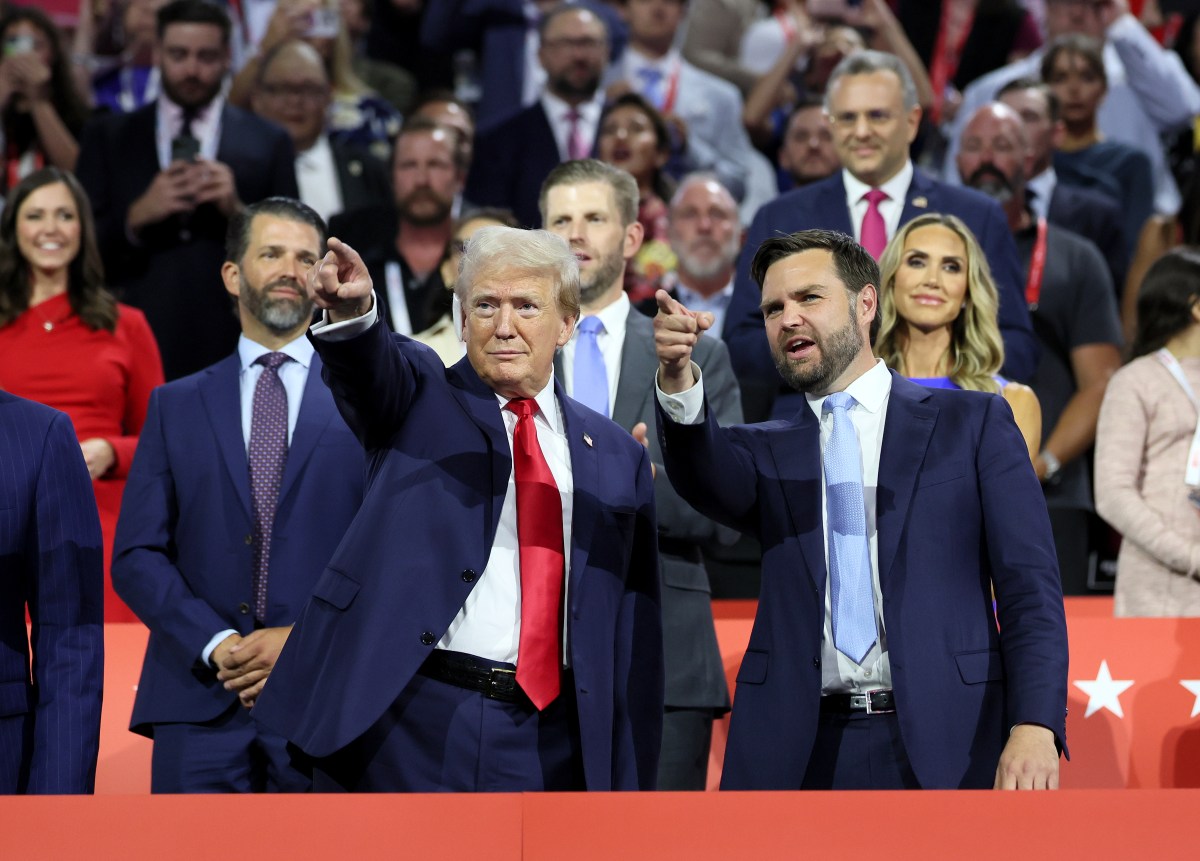
The defining image of the first night of the Republican National Convention came when Donald Trump made his first public appearance since he was shot in the ear on Saturday night. Just a couple nights after a would-be assassin’s bullet came within an inch of taking the former president’s life, Trump strode through the Fiserv Forum in Milwaukee while his fans cheered and Lee Greenwood sang “God Bless the U.S.A.” When Trump took a seat in his box, he wasn’t quite misty-eyed, but you could see a degree of gratitude and emotion in his eyes rarely seen in a public appearance.
But images are fleeting, and the defining action from the first day of the 2024 RNC that will have the longest-lasting impact on the Republican party and the country was the nomination of Sen. J.D. Vance as the 2024 Republican vice presidential candidate. While Trump felt the need to select a classic Reaganite as his running mate in 2016, Trump in 2024 felt emboldened to pick a senator who has reinvented himself as an absolute loyalist to Trump, one who has indicated he would carry out an agenda of “post-liberalism” when he likely assumes the role of GOP presidential frontrunner in 2028.
“That’s what you get for winning. You get to pick who you want,” former Arkansas Gov. Asa Hutchinson told Dispatch Politics shortly after Vance was formally nominated. “It’s a dramatic change, and it reflects that this is Trump’s party.” When Hutchinson, a Reaganite and Trump critic who ended his own 2024 presidential bid in January, was asked about Vance’s opposition to aid for Ukraine and support for more government intervention in the U.S. economy, he replied that “Vance is even more hardcore on those issues that President Trump,” which is why Hutchinson said he and some other delegates would have preferred Sen. Marco Rubio of Florida as Trump’s running mate.
But Trump’s 2024 Republican convention has made it clear to classic Reagan Republicans they are welcome only as very junior partners, so long as they’re willing to tolerate whatever Trump serves up.
Conservatives in the party of Reagan often spoke of a three-legged stool of social conservatism, fiscal conservatism, and a hawkish foreign policy. But on Monday night, social conservatives in Trump’s party were expected to stomach a prime-time speaking appearance of internet personality Amber Rose, who has publicly praised “satanists” because they help women “get abortions in southern states” and publicly explained she tells her young children that her OnlyFans page is a positive thing. Fiscal conservatives were treated to a prime-time speech by Teamsters union President Sean O’Brien, who demagogically denounced big business: “Elites have no party, elites have no nation. Their loyalty is to the balance sheet and the stock price at the expense of the American worker.” And hawks were told by billionaire David Sacks that Vladimir Putin was “provoked, yes provoked” to launch a full-scale invasion of Ukraine by President Biden’s talk of expanding NATO.
The motive for welcoming these disparate voices at the 2024 Republican convention is not primarily ideological, of course. A willingness to fulsomely praise and help Trump—even after January 6, 2021—is the most important credential for any person to attain a position of prominence in the Republican party in 2024. That’s the reason why Vance was immediately to the left of Trump on Monday night and why Tucker Carlson was sitting two seats to his right.
Where does that leave the small rump of Reaganites in the convention hall who have been willing to criticize Trump? Hutchinson, for example, said in May that he would not endorse Trump because Trump had “disqualified” himself on January 6, 2021, and “continues to undermine our democracy by defending the actions of that dark day.”
“Regretfully, Donald Trump has redefined the GOP in his image and has put personal ego above the common good,” Hutchinson wrote at the time. But asked on Monday if the assassination attempt and calls for a “unity” convention have made him consider voting for Trump, Hutchinson told Dispatch Politics, “I just keep my options open.” Hutchinson said he would be looking at the “tone” of the convention, adding, “I'm going to be voting for a Republican—it's just a question of who that is."
A Unifying Tone—For Now
Will we hear from a new Donald Trump in Milwaukee this week? In an interview Sunday with the Washington Examiner, the former president said the near-death experience of his attempted assassination inspired him to change the speech he will give Thursday here at the Republican National Convention to focus more on national unity than on criticizing Joe Biden’s presidency.
On the first day of the convention, speakers and attendees mostly lived up to that spirit. Attacks on Biden and Vice President Kamala Harris focused on their administration’s policies and the president’s declining mental acuity. Even amid very strong denunciations of Biden’s job performance, few speakers portrayed him as an existential threat to the country, and most gave a message of hope for a second Trump term.
“I know that many of you are angry, but now is the time to unite, and we have to get to work,” South Dakota Gov. Kristi Noem said in her speech. “We have to win the hearts and minds of every single American, wake them up with truth and with wisdom. We need to listen to them. You can’t win people over by arguing with them.”
North Carolina gubernatorial candidate Lt. Gov. Mark Robinson, who has a history of making inflammatory statements, made similar comments. He told the story of his family falling on hard times but pulling through.
“In North Carolina, factories just like the one I worked at are closing, leaving families feeling hopeless. But there is hope, and I’m proof,” Robinson said. “My wife and I never gave up. We kept our faith. We worked hard and made it through those tough times. Now, I stand before you on the verge of becoming the first black governor of North Carolina. As governor I will not forget where I came from or the struggles of the people I meet. And, you know, there’s someone else who will fight just as hard for you: President Donald J. Trump.”
Other GOP figures who have a history of controversial rhetoric brought their remarks to the line—but did not cross it. Turning Point USA founder and close Trump ally Charlie Kirk decried the Biden-Harris “regime” but said in November the country would “choose success.” And firebrand Rep. Marjorie Taylor Greene of Georgia also expressed her confidence that Trump would win and govern well, amid her condemnations of Biden’s policies.
“An American government that serves the interests not of the wealthy, the globalists, or the powerful few, but of all hard-working Americans is within our grasp,” she told the crowd.
Yet there were hints of the old, pre-shooting tone that slipped through the filters.
“Today’s Democrat agenda, their policies, are a clear and present danger to America, to our institutions, our values, and our people,” Sen. Ron Johnson of Wisconsin told the crowd. But when he was asked about the content of his speech by a reporter, he said the teleprompter mistakenly loaded his old speech and that the correct one would have called for unity.
Biden’s Muddled Post-Shooting Interview
While the primetime events were getting underway in Milwaukee, NBC News aired an uncut interview with President Joe Biden. It was his first since the attempted assassination of Donald Trump and another chance for the Democratic incumbent to settle concerns from his own party about his fitness to run for a second term.
The result was hardly helpful to Biden. The 18-minute interview with anchor Lester Holt featured a president still struggling to answer questions fluidly, complete sentences and ideas, and even get basic facts correct.
Even when asked what would happen if he has another episode like the June 27 debate after he is formally nominated, Biden seemed to fall into another such episode in miniature. Perhaps confused by Holt’s question, the president responded “What happened?” followed by what the NBC transcript described as “INAUDIBLE” but might more accurately be described as inscrutable gibberish.
While the entire NBC interview was not as difficult to follow, many of Biden’s responses to Holt’s questions were reminiscent of both his performance at last month’s presidential debate and his July 5 interview with ABC News: discursive and low-energy. And while public calls from fellow Democrats for Biden to leave the race have dissipated since this weekend’s events, the president’s performance Monday was unlikely to alter the efforts of those Democratic leaders trying to push him out from behind the scenes.
Early on, Holt asked Biden to provide his first reaction to the news about the shooting at the Trump rally. “My first reaction was, ‘My God. This is–’” Biden said before pausing and changing course without finishing his answer.
“Look, there’s so much violence now and the way we talk about it. I mean, the whole notion that there is this, there’s, there’s no place at all for violence in politics in America. None. Zero. And, we’ve reached a point where it’s, it’s become too commonplace, not assassinations, but to talk about it,” he said, before continuing with a story he frequently tells about being inspired to run for president in 2020 after Trump’s response to the violent white supremacist march in Charlottesville, Virginia, in 2017. When asked if he believed the shooting had changed the trajectory of the race, Biden said he hadn’t thought about it and volleyed the question back to Holt.
There were other muddled moments. Holt asked if Biden had heard from the director of the Secret Service, who happens to be a woman named Kimberly Cheatle, since the shooting. “Oh, I’ve heard from him,” Biden said (emphasis added). When asked to explain moments in the debate when Biden appeared confused, the president shot back angrily that NBC News wasn’t focusing on Trump.
“Lester, look, why don’t you guys ever talk about the 18, the 28 lies he told? Where—where are you on this? Why doesn’t the press ever talk about that?” Biden asked. (Holt eventually replied, correctly, that the network had covered Trump’s falsehoods.)
At the end of Holt’s line of questioning about various Democrats who have called on Biden to withdraw from the race, or at least reconsider it, the anchor asked the president who he listens to on these “deeply personal issues.”
“Me,” Biden responded, vocalizing what has frustrated many Democrats worried that the president himself is allowing the White House to fall back into the hands of Trump and the GOP.
Notable and Quotable
“Let us pray … that means be quiet! Bow your heads.”
—Connecticut Republican National Committeewoman Leora Levy before delivering an on-stage benediction during day one of the RNC in Milwaukee.




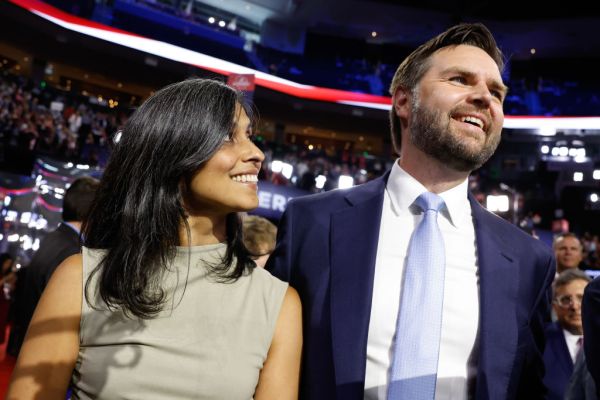
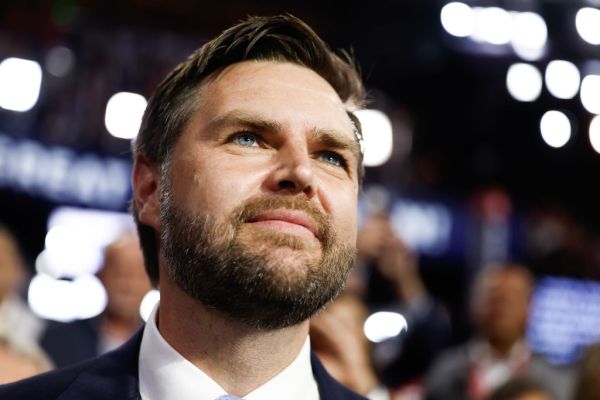
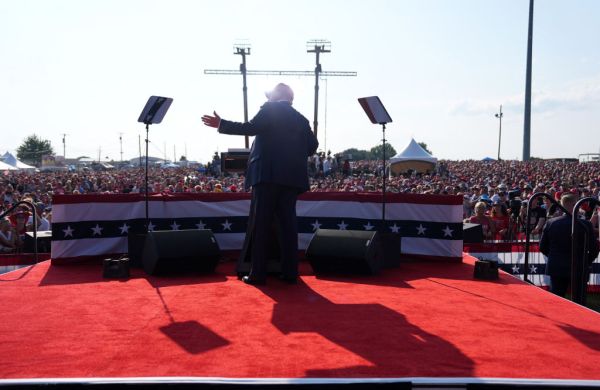

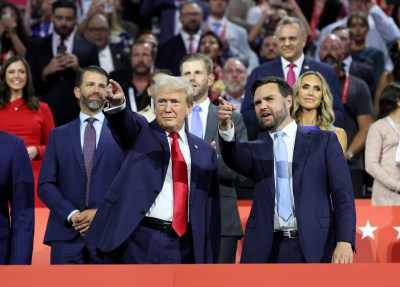
Please note that we at The Dispatch hold ourselves, our work, and our commenters to a higher standard than other places on the internet. We welcome comments that foster genuine debate or discussion—including comments critical of us or our work—but responses that include ad hominem attacks on fellow Dispatch members or are intended to stoke fear and anger may be moderated.
With your membership, you only have the ability to comment on The Morning Dispatch articles. Consider upgrading to join the conversation everywhere.